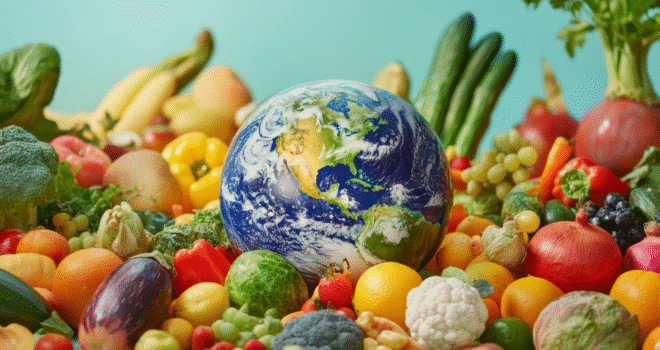Food is at the heart of today’s global issues, as it is intimately linked to both human health and the well-being of our planet. The challenge? Feeding the world's population in a nutritionally adequate way, while ensuring the sustainability of our food systems.
Plant-based food: at the crossroads of health issues
Worldwide, the two main risk factors reducing healthy life expectancy are dietary: malnutrition first, followed by nutritional risks. Among these, insufficient consumption of plant-based foods – particularly whole grains, fruits, nuts and seeds, and vegetables – clearly stands out as a major factor reducing the number of “healthy life years”.
![]() Did you know ? The five main dietary risks affecting life expectancy are: lack of wholegrain cereals, excess sodium, lack of fruit, lack of nuts and seeds, and lack of vegetables.
Did you know ? The five main dietary risks affecting life expectancy are: lack of wholegrain cereals, excess sodium, lack of fruit, lack of nuts and seeds, and lack of vegetables.
Food systems and sustainability: close links
Food systems have the potential to safeguard human health and support sustainability, but they currently threaten both. There are glaring imbalances: on the one hand, over 800 million people do not have access to sufficient food; on the other, an even greater number over-consume food of poor nutritional quality, resulting in the development of obesity and many associated diseases.
Is it “just” a problem of distribution? No: on a global scale, the agricultural system overproduces cereals, fats, and sugars, while the production of fruit, vegetables, and proteins is insufficient to meet the nutritional needs of today’s population.
Furthermore, we now know that obesity, malnutrition and climate change are interconnected issues. Over-consumption of food, for example, contributes to an unnecessarily high production of greenhouse gases (GHGs). On the other hand, climate change is likely to exacerbate undernutrition and malnutrition, by impacting food prices.
According to researchers, the only way to achieve a nutritionally balanced diet, save land and reduce greenhouse gas emissions is to eat and produce more fruit and vegetables, while shifting towards a diet that places greater emphasis on plant-based proteins.
Food systems are responsible for 25-30% of global greenhouse gas emissions (agriculture, processing, fuels, fertiliser production, etc.).
Plant-based diets at the heart of the recommendations
How can we reconcile “nutrition” and “sustainability” on our plates? The work of the EAT-Lancet Commission led to the formulation of this ideal plate, which is characterised by an abundant and varied plant-based component: 850 g per day of wholegrain cereals, fruits and vegetables, legumes and nuts.
Globally, meat and sugar consumption should be reduced by 50% and consumption of nuts, fruits, vegetables and legumes should be doubled (EAT-Lancet Commission)
A committed act: Studies show that in Western countries, adopting a diet consisting of two-thirds plant-based proteins and one-third animal-derived proteins reduces the carbon footprint of the diet (resulting in lower greenhouse gas emissions) by approximately 35%, as well as decreasing the use of agricultural land. The act of eating has become a way of expressing our commitment (or lack thereof) to the fight against climate change.
Putting plant-based diets into practice
Plant-based food, rich in nutrients and respectful of the planet, is an essential part of this transition to a healthier, more sustainable future. By adopting sustainable farming practices and changing our eating habits, it is possible to reconcile the imperatives of human health and environmental protection.
The Louis Bonduelle Foundation is strongly committed to these issues. It takes action and endeavours to provide tools to facilitate the implementation of the recommendations. (For more information on the Foundation’s actions: click here !)
Source : « L’alimentation végétale. Pour répondre aux enjeux planétaires : pourquoi et comment ? », 2021 (Fondation Louis Bonduelle)



 Jerusalem artichoke
Jerusalem artichoke  Red kidney beans
Red kidney beans  Crop Rotation
Crop Rotation 









